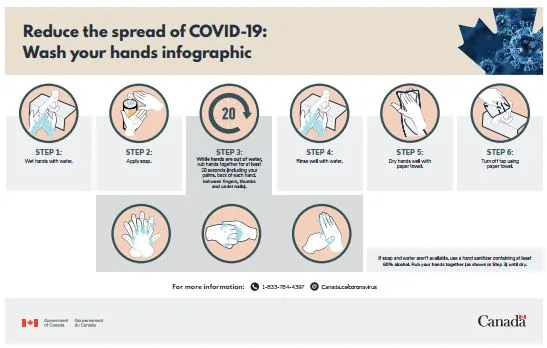Ottawa – Personal protective measures are actions you can take to reduce your risk of getting or spreading respiratory infectious diseases, such as:
- the flu
- COVID-19
- respiratory syncytial virus (RSV)
These actions are also known as public health measures that can be used by individuals.
Personal protective measures work by breaking the chain of infection. This means stopping viruses and bacteria from spreading to an uninfected person through:
- contaminated objects
- a person who is infected
These measures have always been an important part of preventing illness. They will continue to be important to help prevent the spread of respiratory infectious diseases, and can be used beyond the COVID-19 pandemic.
Learn more about:
How respiratory infectious diseases spread
Respiratory infectious diseases can spread in different ways, including from:
- person to person (direct transmission)
- contact with contaminated surfaces or objects (indirect transmission)
Many respiratory infectious diseases spread through a combination of both, so it’s best to use more than one personal protective measure at a time.
Person-to-person spread
Respiratory infectious diseases can spread through respiratory particles when a person who is infected releases them into the air. This can happen in many ways, including when someone:
- breathes
- talks
- coughs
- sneezes
- sings
- shouts
You may become infected with viruses or bacteria if:
- you breathe infectious particles in
- infectious particles come into contact with your eyes, nose or mouth
Spread through contaminated surfaces or objects
You can also become infected if you touch a contaminated surface or object (like a door handle), and then touch your eyes, nose or mouth before you clean your hands.
Who is at risk
Some people are at a greater risk of serious complications from respiratory infectious diseases than others, including:
- people who are pregnant
- people who aren’t vaccinated
- people living with lung disease
- older persons, especially over 65 years of age
- young children, especially those who are under 5 years of age
- infants, especially those who are premature or under 6 months of age
- people with chronic medical conditions, including those who are immunocompromised
Depending on the disease, there may be other groups who are at greater risk of serious complications from respiratory infections.
Learn more about:








